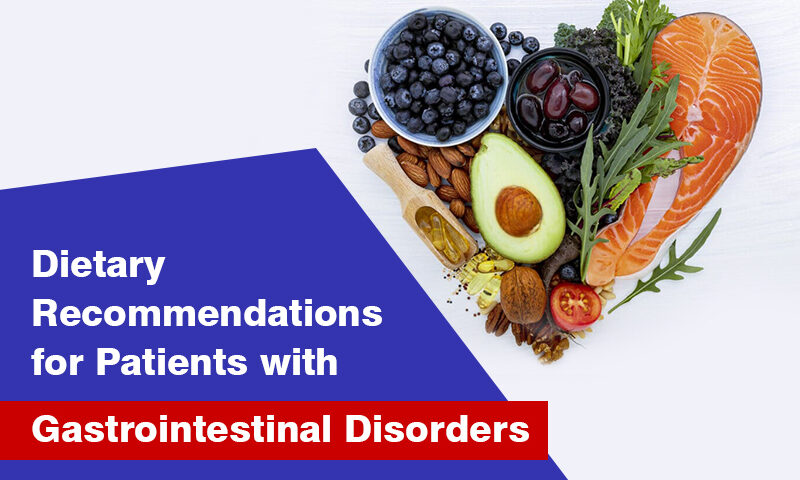Dietary Recommendations for Patients with Gastrointestinal Disorders

Pancreatic Cancer – Is screening required?
April 11, 2022
Understanding Common Gastrointestinal Disorders: A Comprehensive Guide
June 26, 2023Living with gastrointestinal disorders can be challenging, as these conditions often require careful attention to one's diet. The foods we consume can greatly impact the symptoms and overall management of gastrointestinal disorders. In this article, we will discuss dietary recommendations and guidelines that can help patients effectively manage their condition, reduce symptoms, and improve their overall well-being.
Understanding Gastrointestinal Disorders
Gastrointestinal disorders encompass a range of conditions that affect the digestive system, including the esophagus, stomach, small intestine, and large intestine. Examples of such disorders include gastroesophageal reflux disease (GERD), irritable bowel syndrome (IBS), Crohn's disease, and ulcerative colitis. These conditions can cause various symptoms such as abdominal pain, bloating, diarrhea, constipation, and acid reflux.
The Role of Diet in Gastrointestinal Disorders
Diet plays a crucial role in managing gastrointestinal disorders. Certain foods can trigger or exacerbate symptoms, while others can provide relief and promote healing. By making appropriate dietary choices, individuals can effectively manage their condition and improve their quality of life.
General Dietary Guidelines
When it comes to gastrointestinal disorders, there are some general dietary guidelines that can be beneficial for most patients. These guidelines include:
- Consuming smaller, frequent meals rather than large meals
- Eating slowly and chewing food thoroughly
- Avoiding or limiting intake of spicy, greasy, and fatty foods
- Avoiding or reducing the consumption of alcohol and caffeine
- Limiting the intake of carbonated beverages
- Avoiding smoking and tobacco products
Foods to Include in a Gastrointestinal-Friendly Diet
A gastrointestinal-friendly diet should primarily consist of easily digestible and nourishing foods. Here are some examples of foods that are generally well-tolerated and can provide essential nutrients:
- Lean proteins: Skinless poultry, fish, tofu, and legumes.
- Whole grains: Oats, brown rice, quinoa, and whole-wheat bread.
- Low-fat dairy products: Yogurt, cottage cheese, and skim milk.
- Fresh fruits and vegetables: Such as bananas, apples, carrots, and leafy greens.
- Healthy fats: Avocado, olive oil, and nuts in moderation.
Foods to Avoid or Limit
While each individual's tolerance to specific foods may vary, there are some common culprits that tend to trigger gastrointestinal symptoms. It's advisable to avoid or limit the following:
- Spicy foods: Hot peppers, chili powder, and spicy sauces.
- Fatty and fried foods: Fast food, deep-fried dishes, and high-fat meats.
- Citrus fruits and juices: Oranges, grapefruits, and lemonade.
- Carbonated beverages: Soda, sparkling water, and fizzy drinks.
- Caffeine and alcohol: Coffee, tea, energy drinks, and alcoholic beverages.
Importance of Hydration
Proper hydration is crucial for maintaining gastrointestinal health. Drinking an adequate amount of water helps in digestion, prevents constipation, and ensures the overall well-being of the digestive system. It is recommended to drink at least 8 glasses of water per day, or more if needed.
The Significance of Portion Control
Practicing portion control is essential for individuals with gastrointestinal disorders. Eating smaller meals throughout the day can help prevent overloading the digestive system, reduce discomfort, and promote better digestion. It is advisable to listen to the body's signals of hunger and fullness, and avoid overeating.
Meal Planning and Preparation Tips
Planning and preparing meals in advance can make it easier to follow a gastrointestinal-friendly diet. Here are some tips:
- Plan meals that include a balance of proteins, carbohydrates, and healthy fats.
- Incorporate a variety of fruits and vegetables to ensure a wide range of nutrients.
- Use cooking methods such as baking, grilling, or steaming instead of frying.
- Experiment with herbs and spices to add flavor without causing digestive distress.
- Pack homemade meals or snacks when eating out to maintain dietary control.
Incorporating Fiber into the Diet
Fiber plays a crucial role in maintaining a healthy digestive system. However, individuals with gastrointestinal disorders should be mindful of the type and amount of fiber they consume. Soluble fiber, found in foods such as oats, legumes, and some fruits, can be beneficial. Insoluble fiber, found in whole grains and vegetables, may be better tolerated in smaller amounts or cooked.
Managing Specific Gastrointestinal Disorders
Different gastrointestinal disorders may require specific dietary considerations. It is important to work closely with a healthcare professional or a registered dietitian who can provide personalized guidance based on the specific condition. For example:
- Individuals with GERD may benefit from avoiding spicy foods and acidic beverages.
- Those with IBS may find relief by following a low-FODMAP diet and identifying trigger foods.
- Patients with Crohn's disease or ulcerative colitis may require tailored diets to manage inflammation and optimize nutrient absorption.
Frequently Asked Questions (FAQs)
Managing a gastrointestinal disorder through dietary interventions is a crucial aspect of overall treatment and symptom management. By following the recommended dietary guidelines, incorporating suitable foods, and seeking professional guidance, individuals can effectively manage their condition, reduce symptoms, and improve their quality of life.
In conclusion, adopting a well-planned and personalized gastrointestinal-friendly diet can greatly contribute to the management of gastrointestinal disorders. By making conscious choices, seeking professional guidance from healthcare experts like Dr. Chirayu Chokshi, and incorporating healthy habits, individuals can improve their digestive health and enhance their overall quality of life. Dr. Chokshi's expertise and guidance can provide valuable insights and support in navigating the dietary challenges associated with gastrointestinal disorders. Remember, with the right approach to nutrition and professional guidance, individuals can take control of their gastrointestinal health and experience improved well-being.


